
Florida Supreme Court unveils a revamped summary judgment rule just in time for the May 1, 2021 effective date.
Overview | Blog Posts | Appellate | Mihaela Cabulea | Related | Print | Share
April 29, 2021
On December 31, 2020, the Florida Supreme Court issued an opinion amending Florida Rule of Civil Procedure 1.510 governing summary judgment proceedings, to adopt the summary judgment standard articulated by the United States Supreme Court in Celotex Corp. v. Catrett, 477 U.S. 317 (1986); Anderson v. Liberty Lobby, Inc., 477 U.S. 242 (1986); Matsushita Electric Industrial Co. v. Zenith Radio Corp., 475 U.S. 574 (1986), but without making substantive changes to the rule. The court made the effective date May 1, 2021, to allow for comments from the public.
After receiving comments and hearing oral argument, the court issued an opinion further amending rule 1.510, to adopt the text of the federal summary judgment rule itself. The effective date of the amendments remains May 1, 2021. In making these additional amendments, the court was persuaded by the majority of the comments received that the best way to implement the federal summary judgment standard in Florida courts would be to adopt in great part the text of Federal Rule of Civil Procedure 56. The court emphasized the following three underlying points encapsulated in the revamped version of rule 1.510:
- The fundamental similarity between the summary judgment standard and the directed verdict standard: under both standards, the only touchstone that accurately measures whether there exists a genuine issue of material fact is the substantive evidentiary burden of proof that each party bears at trial.
- When the movant does not bear the burden of persuasion at trial, the movant can obtain summary judgment without having to disprove the nonmovant’s case; rather, the movant can satisfy its initial burden of production in either of two ways:
“[I]f the nonmoving party must prove X to prevail [at trial], the moving party at summary judgment can either produce evidence that X is not so or point out that the nonmoving party lacks the evidence to prove X.” Bedford v. Doe, 880 F.3d 993, 996-97 (8th Cir. 2018). “A movant for summary judgment need not set forth evidence when the nonmovant bears the burden of persuasion at trial.” Wease v. Ocwen Loan Servicing, L.L.C., 915 F.3d 987, 997 (5th Cir. 2019).
In re Amendments to Florida Rule of Civil Procedure 1.510, SC20-1490 at *7 (Fla. Apr. 29, 2021).
- The correct test for the existence of a genuine factual dispute is no longer “the slightest doubt” being raised by the nonmovant, but whether “the evidence is such that a reasonable jury could return a verdict for the nonmoving party.” Id. (quoting Anderson, 477 U.S. at 248). Under the new rules:
“[w]hen opposing parties tell two different stories, one of which is blatantly contradicted by the record, so that no reasonable jury could believe it, a court should not adopt that version of the facts for purposes of ruling on a motion for summary judgment.” Id. (quoting Scott v. Harris, 550 U.S. 372, 380 (2007)).
Id. at *7.
The court further emphasized that under the new rule the trial court is mandated to state the reasons for granting or denying summary judgment, and explained that in order to comply with this requirement, it is not enough for the trial court to make a conclusory statement that there is or there is not a genuine dispute of material fact. Id. at 11. The court agreed with the commenters that this requirement would ensure that “Florida courts embrace the federal summary judgment standard in practice and not just on paper.” Id.
Another change worth mentioning concerns the deadlines for filing a summary judgment motion and a response to the motion. Under the current rule, the movant was required to serve the summary judgment motion 20 days before the hearing date and the nonmovat could designate its summary judgment evidence by electronic notice 2 days prior to the hearing. This often left the movant scrambling last minute to respond to the opposition to its summary judgment motion. Under the new rule, this problem is alleviated by requiring the nonmovant to serve its response at least 20 days prior to the hearing. The movant must serve the summary judgment motion at least 40 days in advance of the hearing.
Any party submitting affidavits in bad faith or for purposes of delay may be subject to sanctions, including attorney’s fees and reasonable expenses, or may be held in contempt of court.
This amendment is a welcome change that in time will likely eliminate or reduce:
- needless litigation costs for Florida businesses and consumers when the party opposing summary judgment could not succeed at trial as a matter of law;
- disparate results in state and federal courts on the same substantive issues;
- frivolous claims that currently clog Florida’s state courts; and
- forum shopping.
It will also promote efficiency in the resolution of cases by:
- forcing parties to evaluate the discovery and applicable law prior to undertaking the substantial delay and expense of a trial;
- testing the strength of the parties’ cases and prompting settlement when a nonmovant’s claim survives summary judgment; and
- helping Florida courts achieve the policy goals behind the summary judgment rule, by promoting the just, speedy, and inexpensive resolution of cases.
The language of the amended rule provides as follows:
Rule 1.510. Summary Judgment
- Motion for Summary Judgment or Partial Summary Judgment. A party may move for summary judgment, identifying each claim or defense—or the part of each claim or defense—on which summary judgment is sought. The court shall grant summary judgment if the movant shows that there is no genuine dispute as to any material fact and the movant is entitled to judgment as a matter of law. The court shall state on the record the reasons for granting or denying the motion. The summary judgment standard provided for in this rule shall be construed and applied in accordance with the federal summary judgment standard.
- Time to File a Motion. A party may move for summary judgment at any time after the expiration of 20 days from the commencement of the action or after service of a motion for summary judgment by the adverse party. The movant must serve the motion for summary judgment at least 40 days before the time fixed for the hearing.
- Procedures.
- Supporting Factual Positions. A party asserting that a fact cannot be or is genuinely disputed must support the assertion by:
- citing to particular parts of materials in the record, including depositions, documents, electronically stored information, affidavits or declarations, stipulations (including those made for purposes of the motion only), admissions, interrogatory answers, or other materials; or
- showing that the materials cited do not establish the absence or presence of a genuine dispute, or that an adverse party cannot produce admissible evidence to support the fact.
- Objection That a Fact Is Not Supported by Admissible Evidence. A party may object that the material cited to support or dispute a fact cannot be presented in a form that would be admissible in evidence.
- Materials Not Cited. The court need consider only the cited materials, but it may consider other materials in the record.
- Affidavits or Declarations. An affidavit or declaration used to support or oppose a motion must be made on personal knowledge, set out facts that would be admissible in evidence, and show that the affiant or declarant is competent to testify on the matters stated.
- Timing for Supporting Factual Positions. At the time of filing a motion for summary judgment, the movant must also serve the movant’s supporting factual position as provided in subdivision (1) above. At least 20 days before the time fixed for the hearing, the nonmovant must serve a response that includes the nonmovant’s supporting factual position as provided in subdivision (1) above.
- Supporting Factual Positions. A party asserting that a fact cannot be or is genuinely disputed must support the assertion by:
- When Facts Are Unavailable to the Nonmovant. If a nonmovant shows by affidavit or declaration that, for specified reasons, it cannot present facts essential to justify its opposition, the court may:
- defer considering the motion or deny it;
- allow time to obtain affidavits or declarations or to take discovery; or
- issue any other appropriate order.
- Failing to Properly Support or Address a Fact. If a party fails to properly support an assertion of fact or fails to properly address another party’s assertion of fact as required by rule 1.510(c), the court may:
- give an opportunity to properly support or address the fact;
- consider the fact undisputed for purposes of the motion;
- grant summary judgment if the motion and supporting materials including the facts considered undisputed—show that the movant is entitled to it; or
- issue any other appropriate order.
- Judgment Independent of the Motion. After giving notice and a reasonable time to respond, the court may:
- grant summary judgment for a nonmovant;
- grant the motion on grounds not raised by a party; or
- consider summary judgment on its own after identifying for the parties material facts that may not be genuinely in dispute.
- Failing to Grant All the Requested Relief. If the court does not grant all the relief requested by the motion, it may enter an order stating any material fact—including an item of damages or other relief—that is not genuinely in dispute and treating the fact as established in the case.
- Affidavit or Declaration Submitted in Bad Faith. If satisfied that an affidavit or declaration under this rule is submitted in bad faith or solely for delay, the court—after notice and a reasonable time to respond—may order the submitting party to pay the other party the reasonable expenses, including attorney’s fees, it incurred as a result. An offending party or attorney may also be held in contempt or subjected to other appropriate sanctions.
For any further questions, please contact Mihaela Cabulea.



